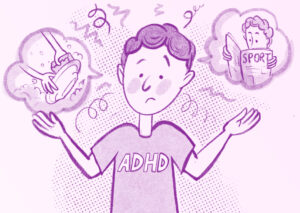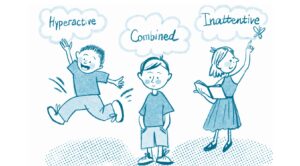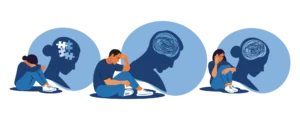Depression is a widespread mental health condition that affects millions of people worldwide. It goes far beyond feeling sad or having a bad day. For those suffering from depression, life can become an overwhelming struggle characterized by persistent feelings of hopelessness, low energy, and loss of interest in activities once enjoyed. While depression can feel isolating, the good news is that recovery is possible — and therapy plays a vital role in that healing journey.
In this blog, we will explore how therapy can help individuals recover from depression by providing support, coping strategies, and new perspectives. We’ll also discuss different therapy types, what to expect during treatment, and the long-term benefits of seeking professional help.
Table of Contents
ToggleUnderstanding Depression: More Than Just Sadness
Depression is a complex mental health disorder that can manifest in various ways, including:
- Persistent sadness or emptiness
- Loss of interest in hobbies and socializing
- Changes in appetite and sleep patterns
- Difficulty concentrating or making decisions
- Feelings of worthlessness or guilt
- Fatigue and low energy
- Thoughts of death or suicide
It is important to recognize that depression is not a sign of personal weakness or something that can be “snapped out of.” It is a medical condition influenced by genetics, brain chemistry, life experiences, and environmental factors.
Why Therapy Is Essential for Depression Recovery
While medication can be helpful, especially in moderate to severe cases, therapy offers tools and insights that address the root causes and thought patterns that sustain depression. Therapy is an active process that empowers individuals to understand their condition, develop healthier coping mechanisms, and rebuild emotional resilience.
Here are key reasons therapy is essential in depression recovery:
1. Safe Space to Express Feelings
Depression can cause intense feelings of shame, guilt, and isolation. Therapy provides a confidential, non-judgmental space where individuals can openly share their thoughts and emotions. This expression alone can relieve emotional burden and reduce feelings of loneliness.
2. Identifying Negative Thought Patterns
Cognitive distortions, or negative thinking habits, are common in depression. Therapy helps individuals recognize these unhelpful patterns—such as black-and-white thinking, catastrophizing, or self-blame—and learn to challenge and replace them with more balanced thoughts.
3. Building Coping Strategies
Depression can sap energy and motivation, making everyday tasks feel impossible. Therapists teach practical skills for managing symptoms, including relaxation techniques, problem-solving methods, and ways to increase engagement in pleasurable activities.
4. Addressing Underlying Issues
Therapy can uncover unresolved traumas, relationship conflicts, or stressors contributing to depression. Working through these root causes is vital to long-term healing and preventing relapse.
5. Support for Behavioral Change
Therapists guide clients in setting achievable goals, improving communication, and developing healthy routines. This structured support encourages positive behavior changes that promote mental wellness.
Types of Therapy That Help Treat Depression
Various therapeutic approaches have been shown effective in treating depression. The choice depends on individual needs, preferences, and the nature of the depression.
Cognitive Behavioral Therapy (CBT)
CBT is one of the most widely used therapies for depression. It focuses on identifying and changing negative thought patterns and behaviors. CBT is practical and goal-oriented, often involving homework assignments and skill-building exercises.
Interpersonal Therapy (IPT)
IPT focuses on improving interpersonal relationships and social functioning. It helps individuals understand how their interactions impact mood and develop better communication and conflict-resolution skills.
Psychodynamic Therapy
This approach explores unconscious emotions and past experiences to gain insight into current feelings and behaviors. It helps resolve deep-seated emotional conflicts that contribute to depression.
Mindfulness-Based Cognitive Therapy (MBCT)
MBCT combines traditional cognitive therapy with mindfulness techniques. It teaches individuals to stay present, reduce rumination, and develop self-compassion, which can prevent depressive relapse.
Behavioral Activation
This therapy encourages re-engagement with meaningful activities to combat inactivity and withdrawal common in depression. It helps rebuild a sense of purpose and pleasure.
What to Expect in Therapy for Depression
Starting therapy can feel intimidating, but knowing what to expect helps ease anxiety and set realistic expectations.
- Assessment: The therapist will conduct an initial evaluation to understand symptoms, history, and treatment goals.
- Treatment Plan: Based on the assessment, the therapist and client collaborate to create a personalized plan.
- Sessions: Therapy typically involves weekly sessions lasting 45-60 minutes. These sessions focus on exploring feelings, practicing skills, and tracking progress.
- Homework: Many therapy models encourage activities or journaling between sessions to reinforce learning.
- Duration: Treatment length varies depending on severity and individual needs; some may benefit from short-term therapy while others require longer-term support.
The Role of the Therapist: A Guide and Ally
A therapist is not just an advisor but a compassionate ally who listens without judgment and supports you through challenges. They offer expert guidance, motivation, and accountability, helping you stay on track toward recovery.
Benefits of Therapy for Depression
Recovery from depression through therapy offers multiple benefits beyond symptom relief:
- Improved emotional regulation: Better ability to manage difficult feelings.
- Enhanced self-awareness: Understanding triggers and patterns.
- Stronger relationships: Improved communication and connection with others.
- Greater resilience: Skills to cope with future stress and setbacks.
- Increased self-esteem: Recognizing personal strengths and achievements.
- Long-term mental health: Reduced risk of relapse with ongoing strategies.
Overcoming Barriers to Therapy
Despite the benefits, many hesitate to seek therapy due to stigma, cost, or misconceptions. It’s important to recognize therapy as a courageous step toward self-care and healing.
- Stigma: Mental health issues are common, and seeking help is a sign of strength.
- Access: Many options exist including online therapy and sliding-scale fees.
- Misconceptions: Therapy is not just talking; it involves active skill-building and transformation.
How Arpan Sarma Helps You on Your Path to Recovery
As a seasoned psychologist, Arpan Sarma offers compassionate, evidence-based therapy tailored to individual needs. His approach combines empathy with practical strategies to empower clients to overcome depression and reclaim a fulfilling life.
Taking the First Step: Seeking Help
If you’re struggling with depression, know that you don’t have to face it alone. Reaching out to a qualified therapist like Arpan Sarma can be life-changing. Therapy opens doors to understanding yourself better, healing emotional wounds, and building a hopeful future.
Conclusion
Depression is a challenging condition, but with the right therapeutic support, recovery is possible. Therapy provides a safe space, effective tools, and personalized guidance to help you navigate the path to emotional well-being. If you or a loved one are experiencing symptoms of depression, consider therapy as a powerful step toward healing and growth.







